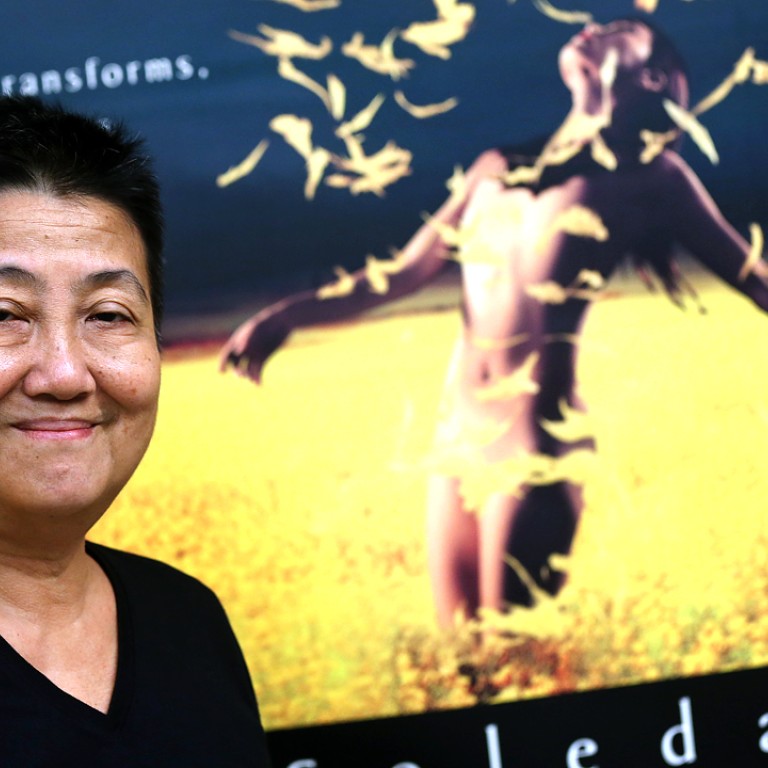
Hong Kong dance doyenne Helen Lai steps out of retirement for One Hundred Years of Solitude production
Award-winning choreographer teams up with composer and performance artist Peter Suart on a work based on Gabriel Garcia Marquez’s literary masterpiece
When Helen Lai Hoi-ling, the award winning doyenne of Hong Kong choreographers, announced she was retiring three years ago, the Hong Kong dance community was stunned.
Luckily, that decision hasn’t proved permanent. This month sees her return to the company she helped found in 1979, City Contemporary Dance Company, with a new full-length work titled Soledad, based on Nobel Prize winner Gabriel Garcia Marquez’s One Hundred Years of Solitude.
In contrast to the immense respect she commands as an artist and the profound themes that characterise her work, in person Lai is charmingly unassuming, with an endearing tendency to giggle when nervous.
So what has brought her out of retirement?
“The chance to work with Peter”, she says promptly, referring to composer and performance artist Peter Suart, who divides his time between Hong Kong and the UK.
Lai had wanted to do a piece with him ever since hearing his music for the dance company’s seminal 365 Ways of Doing and Undoing Orientalism. When they eventually met, it turned out that Suart too was keen on a joint project.
Both voracious readers, they wanted to do something based on a literary text and several ideas were kicked around. When One Hundred Years of Solitude came up, they knew at once that was the right choice.

Garcia Marquez’s magnum opus is a huge, complex work – a masterpiece of magic realism that tells the story of seven generations of the same family in an imaginary town and mixes the supernatural world with the real. It has sold over 30 million copies and been translated into 37 languages.
The New York Times Book Review called it “the first piece of literature since the Book of Genesis that should be required reading for the entire human race”.
A bit of a challenge to adapt for dance, perhaps? Lai agrees. While clearly inspired by the project, she admits to worrying about how they can capture the essence of the book. A literal adaptation is impossible: “We’re not trying to tell the story as such. It’s more putting together impressions.”
She and Suart have also decided neither to reflect the intensely Latin American character of the book (“Although I’m fascinated by that culture”) nor attempt to transpose it to Hong Kong or China, “It will be less specific.”
The collaboration began with Suart composing the music and sending it to Lai. He had helpfully given each section a title, which Lai promptly rejected, she says. “I told him that I was going to use the music differently. He was fine with that.”
As well as composing the score, the multitalented Suart is doing the designs and will appear on stage with the dancers. “Sometimes he will be integrated with the dancers, sometimes he’ll be separate.”
He will also be reading a text – one written by him, not Garcia Marquez – and may (or may not) play a part which refers to a specific character in the book, Lai confides, then adds anxiously, “But I’m not supposed to say anything about that!”

If that sounds ominously dark, audiences can also expect some lively moments. Lai’s gift for comedy and sense of fun surface in even her most sombre works and she points out that, “Garcia Marquez was a very crazy person and there’s a lot of humour in the book. The music is very rhythmic, too.”
Lai’s last project with the company was a revival of her Kafka-inspired The Comedy of K at the end of 2012. Since then, several of the dancers she had worked with for many years have left and it has taken a while for her to get to know the new ones, who she had only seen on stage.
Although at first communication was slow, “they needed time to get used to the way I work”, Lai says she found it refreshing to work with new people and is impressed by energy and commitment of the younger dancers.
One of the more awkward aspects of the process was that another key theme of the book is, as Lai says simply, “lust”. (To give some idea of what this means, one of the main male characters has 17 children with 17 different women.)
In this context it was essential to have what Lai describes as “some deeply sensuous duets”. Initially the dancers found it hard to produce the kind of physicality she was looking for, “Especially the young ones, they were quite shy.”
Eventually they grew bolder and now, Lai says happily, “They’ve given me lots of wonderful duets.”
Lai has been keeping busy during her so-called “retirement”, among other things directing an opera, Heart of Coral, in 2013, and choreographing The Island Whispers for DanceArt in 2014.
What appeals to her most now is tackling work she hasn’t attempted before and that she finds “fun”. After Soledad, there are other potential projects in the pipeline, but Lai is reluctant to discuss them or even think about anything other than the work in hand.
“It’s exhausting, creating a new work.” she says wearily, rubbing her hands over her face.
Having achieved so much in her career, does she have any ambitions left? Not professional ones, she says: “I would like to play the cello better, though.”
Always musical (her father was composer Lai Tso-lin, and her brother Michael Lai Siu-tin, a songwriter), Lai has played the piano since childhood and started learning the cello 10 years ago.
“I don’t want to perform or anything like that. I’d just like to be able to play better,” she says.
Soledad, December 11 and 12, 8pm, Kwai Tsing Theatre Auditorium, HK$140, HK$180 and HK$250, Urbtix. Inquiries: 2329 7803

